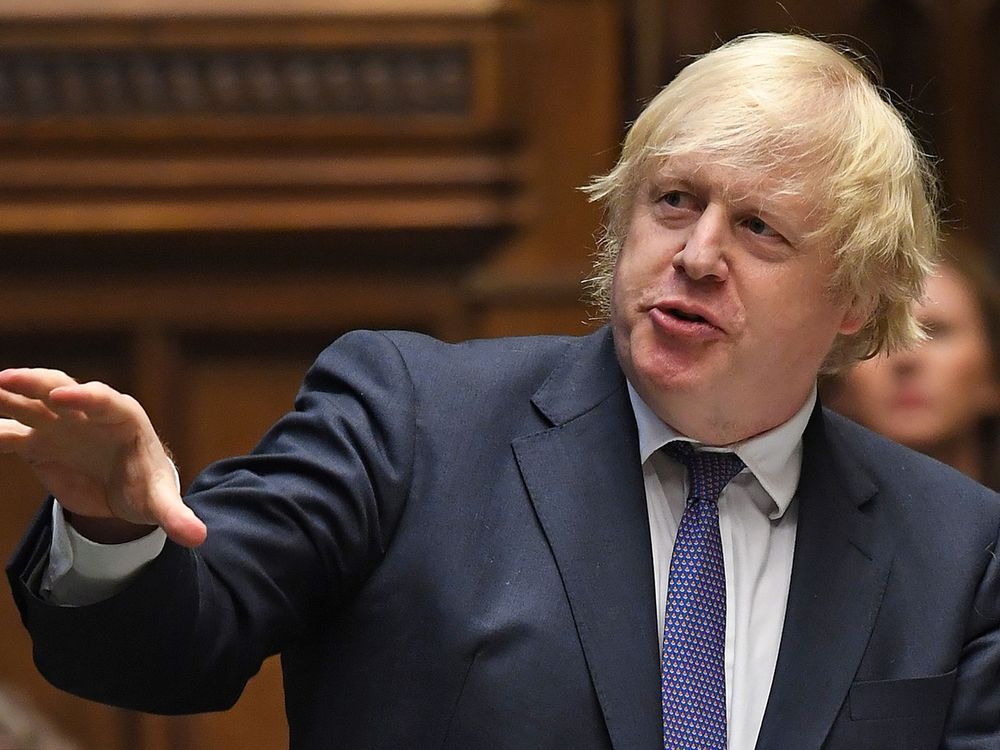Britain’s Prime Minister Boris Johnson shamelessly played on the paranoia of certain segments of the British electorate during the Brexit campaign. He managed to win a thin majority in the Brexit referendum and three years later a majority in the House of Commons. (Jessica Taylor/Getty Images)
The Canadian Oxford Dictionary defines paranoia as “a tendency to suspect and mistrust others.” It is a fairly common mental health disease routinely treated by psychologists and psychiatrists. In some cases it can lead to a profound sense of insecurity. In others it can be a motivator for violent reactions. In recent years, it has come to the fore in the politics of major nations. Leaders have exploited it to defend themselves and to advance their agendas. This has been true in the United Kingdom, France, Russia, China and the United States.
U.K. Prime Minister Boris Johnson rose to fame and political power in the course of the Brexit referendum campaign of 2016. In the course of that campaign, he shamelessly played on the paranoia of certain segments of the British electorate. One point of his appeal was to suggest that Britain was under threat from the faceless bureaucrats of the European Union based in Brussels. According to him, these officials were bent on depriving Britain of the last vestiges of its sovereignty and to reduce a once proud and powerful nation to a servile position in a European federation. The other part of his appeal was to portray Britons as being the victims of a political establishment of privileged people totally detached from the concerns of ordinary citizens. It was in pursuit of this that he chose to cast Prime Minister David Cameron and his associates as a group of upper class “toffs” who had never experienced the travails of the working class. (This was all a bit rich coming from a quintessential establishment figure who was a graduate of Eton and Oxford and who had worked as a journalist for conservative newspapers.) Using both of these tracks, Johnson managed to win a thin majority in the Brexit referendum and three years later a majority in the House of Commons. Exploiting paranoia certainly paid off for him.
Paranoia is also central to the politics of two movements in France. On the one hand, there is the National Front led by Marine Le Pen, who shamelessly exploits the fears of those French citizens who are hostile to the presence of immigrants in their country. She is particularly attuned to the concerns of those who see a threat emanating from the Muslim minority in France. For them, the Muslims are out to destroy French society and its Christian culture. She has built a political career on this and has managed to parlay it into a second-place finish in a recent presidential election. On the other hand, there is the rather inchoate “gilets jaunes” movement, which disrupted normal life in France for over a year. The members of this movement are convinced that France is run by a small cabal of graduates of the Ecole Nationale d’Administration for their own benefit and that of their friends. They feel discriminated against by this elite and vent their anger in often violent protests. Both the National Front and the “gilets jaunes” have done much to undermine rational political dialogue in France.
Then there is Russia, where President Vladimir Putin has fostered anti-western paranoia in his efforts to stay in power. Threats emanating from the West are, of course, a reality in Russian history. In the 18th century, Russia was invaded by the forces of Charles XII of Sweden, in the 19th by those of Napoleon Bonaparte of France and in the 20th by those of Adolf Hitler of Germany. Memories of that last devastating invasion in which 20 million Russians died are still very much alive today and are deliberately rekindled and exploited by Russian leaders. But it is more recent events that are also used by Putin to further his political goals. The eastward expansion of NATO in the past 25 years is portrayed as a direct threat to Russia. So, too, are western efforts to support democracy in Georgia and Ukraine. Putin puts himself forward as the only leader capable of resisting this western onslaught against Russia and its interests. And it has certainly helped to solidify his brand in the eyes of the Russian electorate.
In China, President Xi Jin Ping has also played on his people’s fears of the United States and Japan. In the rhetoric of the Communist party, the United States is portrayed as being bent on “containing” China, much as it did with the Soviet Union during the Cold War. Preventing China from becoming a highly successful country capable of challenging the primacy of the United States in world affairs is seen as a nefarious plot engineered by American decision-makers. Added to the mix is the United States’ friendship and support for Taiwan that the Chinese regards as an intolerable interference in their internal affairs since they consider Taiwan to be an integral part of the People’s Republic. Chinese leaders also evoke the memories of Japan’s brutal occupation of their country during the Second World War to foster hostility towards modern-day Japan, as part of a campaign to promote Chinese nationalism. Promoting fear of both the United States and Japan has become part of the stock in trade of modern Chinese leaders.
Firstly, there is that supreme practitioner of paranoia politics, U.S. President Donald Trump. From the very start of his political career, he has been engaged in promoting fear. During his election campaign in 2016, he made headlines by claiming that immigrants from Mexico were rapists, murderers and drug dealers and that they posed a threat to security and well-being of Americans. He then went on to promise to build a wall along America’s border with Mexico to keep out these undesirables and to have Mexico pay for it. When this promise was met with derision on the part of the Mexican government, Trump kept on repeating it, to the delight of his redneck supporters in southern states.
When evidence began to emerge of Russian meddling in the presidential election, Trump chose not to blame the Russians but to launch attacks on the credibility of the United States’ intelligence and security agencies. He began to portray organizations such as the FBI and the CIA as being part of some “deep state” out to undermine his administration. Without any evidence to support his contentions, he repeatedly sought to undermine the credibility of the U.S. intelligence community, whether in connection with his dealings with Russia or his failed rapprochement with North Korea.
Trump’s ceaseless campaign against the mainstream media has also been an exercise in fostering paranoia. Describing the media as purveyors of “fake news” and as enemies of the people, Trump has played to the basest instincts of his often ill-informed and ill-educated supporters. Depicting the media as part of a liberal elite that has no sympathy for the plight of ordinary Americans, Trump has promoted his image as a populist leader under attack.
Trump’s relations with the Justice Department merit particular attention. Shortly after coming into office, he fired the acting attorney general because she refused to implement his unconstitutional and very obviously Islamophobic decree banning entry into the United States of immigrants or visitors from some Muslim countries. He then launched a very public campaign against Jeff Sessions, whom he had appointed as attorney general, because Sessions had recused himself from involvement in the inquiry into Russian interference in the election campaign. He then went into overdrive to attack the Mueller inquiry, which had been established by the Justice Department to look into the matter. Repeatedly describing the inquiry as a “witch hunt,” he portrayed himself as the victim of a hostile and out of control Justice Department.
Depicting themselves or their followers as victims of supposedly hostile forces has allowed leaders in many countries to enjoy a degree of political success to which they are not otherwise entitled. It is a rather sad commentary on the state of world politics today.
Louis A. Delvoie is a retired Canadian diplomat who served abroad as an ambassador and high commissioner.



































